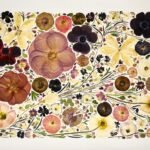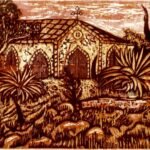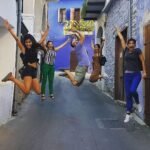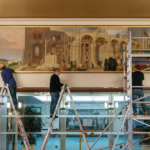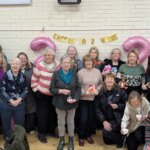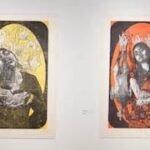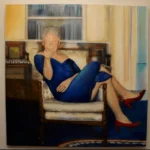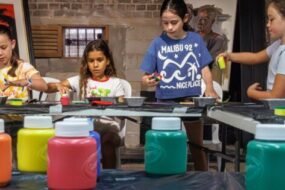
Kip Gresham, who has died aged 72 of pancreatic cancer, made and published prints of works by leading British and international artists. A pioneer in screen-printing technology, he loved collaborating: “The day-to-day reality is one of dirty hands, bad backs, beautiful colours, seductive papers and, above all, surprises from the artists, those magicians,” he wrote. In his own right, he produced colourful abstract works.
He set up his first studio, the Manchester Print Workshop, with his fellow printmaker Steve Currie in 1975. His work with the artist Cecile Elstein featured in the exhibition A Printmaking Partnership (1991), at the city’s Whitworth Gallery, and the painter and poet Adrian Henri was one of his many other collaborators from this period.
In 1982, Kip returned to his native Cambridge to establish the Chilford Hall Press with the entrepreneur Sam Alper, designer of the Sprite caravan and founder of the Little Chef restaurant chain.
The artists he worked with at Chilford, south-east of the city, included Elisabeth Frink, Terry Frost and Philip Sutton. Chilford Hall Press merged with Stanley Jones’s Curwen Studio in 1989 to form Curwen Chilford Prints. Kip added Gillian Ayres, Wilhelmina Barns Graham and Prunella Clough to his client list.
During his time at Curwen Chilford, Kip developed a major technological innovation, True-Grain, with Autotype International (now MacDermid Autotype). True-Grain was a textured sheet of polyester drafting film that marked a breakthrough in the creation of handdrawn prints. The uniquely textured surface and high level of transparency allowed printmakers to make exquisitely fine washes and marks with a huge range of materials and tools. It could then be immediately transferred to silk screens without an intermediate level of photography or laser scanning.
“Generations of screen printers have been schooled to make all artwork opaque,” wrote Kip. “Now levels of transparency are the key in stencil making. In creative terms, this means that the process now has few, if any, limitations.”
The first work made with True Grain was Frink’s Green Man series, and at the end of his partnership with Curwen Studio, Kip made the first of more than 40 editions with Eduardo Paolozzi, who moved with him when he struck out on his own to set up the Gresham Studio at Duxford, south of Cambridge, in 1994.
Over the course of the next seven years, Kip’s collaborations expanded through four portfolios: for the quincentenary of Jesus College, Cambridge (1995); for the first 10 years of the Freud Museum, north London (1996); for the National Museum of Women in the Arts, Washington (1998); and for King’s College, Cambridge (1999). Among the many artists featured were Peter Blake, Patrick Caulfield, Paula Rego and Claes Oldenburg.
After suffering from auto-immune disease in 2001, Kip re-emerged the following year with The Print Studio, Cambridge. The artists returned as well, with Alan Davie, Barry Flanagan and John McLean making multiple prints and editions with Kip until their deaths.
New collaborators included Stephen Chambers, Mali Morris and Nigel Hall. Kip’s work with Chambers resulted in prints both monumental – The Big Country (2012) was made in 78 sections and measures 4 x 15 metres – and extremely intricate.
Kip’s studio pioneered the use of digital methods to fuse Chambers’s drawings, seamlessly, with complex overlapping patterns in a dizzying number of layers and colours.
Born in London, Kip (Christopher) came from a family of medics. Shortly after his birth they moved to Cambridge, where his mother, Gwen (nee Leigh), was a consultant for child community care at Addenbrooke’s hospital, and his father, Austin Gresham, a professor of pathology at Cambridge University.
From the Leys school, in 1969 Kip went to Newcastle University to begin a four-year fine art degree. In 1970 the first major exhibition devoted to a master screen printer, Chris Prater, opened at the Hayward Gallery in London, cementing the craft’s status as a serious medium of artistic production. After a higher diploma in art and printmaking at Manchester Polytechnic (now Manchester Metropolitan University) in 1974, Kip stayed in the city to establish his first workshop.
In the final decade of his life, he remained the go-to printmaker for artists, galleries, and arts institutions looking to explore printmaking, raise funds, or diversify. He worked on several commissions for artists including Hurvin Anderson, Tacita Dean, Nicola Hicks and Ai Weiwei.
Just weeks before he died, Kip was working on a series of monoprints with the American abstract artist Willard Boepple, who had been coming to the studio since 2003. “Kip opened a whole world for me”, Boepple wrote, “building up forms with layer upon layer of translucent colours.”
A complete archive of prints made by Kip since 2002 is held by the Fitzwilliam Museum, Cambridge, and since 1998 by the Kassar Mochary Foundation, Tucson, Arizona. He gave his account of his work in the book Kip Gresham: The Art of Collaboration (2019).
Kip was firmly rooted in his local Cambridge community, belonging to the cycling fraternity, involved in the campaign to save his local pub, The Flying Pig, and taking an active role in St Paul’s church. He was a loving husband, father and grandfather.
In 1973 he married Jane Ashby. She survives him, along with their sons Dan, Matt, Nick and Tim, and five grandchildren.

